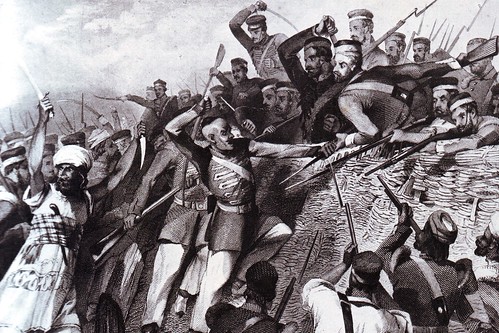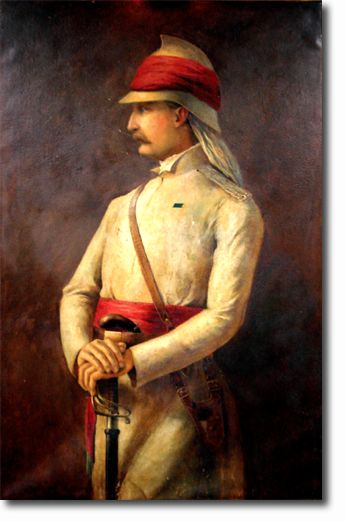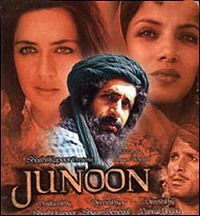1857 Indian Mutiny
Printed From: History Community ~ All Empires
Category: Regional History or Period History
Forum Name: History of the South Asian subcontinent
Forum Discription: The Indian sub-continent and South Central Asia
URL: http://www.allempires.com/forum/forum_posts.asp?TID=30641
Printed Date: 24-Apr-2024 at 18:34
Software Version: Web Wiz Forums 9.56a - http://www.webwizforums.com
Topic: 1857 Indian Mutiny
Posted By: Nick1986
Subject: 1857 Indian Mutiny
Date Posted: 16-Nov-2011 at 19:14
 Here's a topic for our new Indian members. Was the 1857 Mutiny sparked by the troops' anger at being issued cartridges greased with beef-fat, or were there more longstanding causes, like fear the British officers wanted to convert the Indians to Christianity and resentment among the marginalised Mughal-era elite who sought to regain their positions of power? ------------- Me Grimlock not nice Dino! Me bash brains! |
Replies:
Posted By: Nick1986
Date Posted: 24-Nov-2011 at 19:38
|
I'm surprised and a little disappointed none of our Indian members have
commented yet. Perhaps this topic will be of interest to Bulldog or Chookie?
------------- Me Grimlock not nice Dino! Me bash brains! |
Posted By: Toltec
Date Posted: 25-Nov-2011 at 10:12
|
Of the causes you mention, only the third is really relevent, the other two, well the leaders need simple properganda to enrage the masses.
You miss the most important point of the rebellion, India wasn't British, it was under the control of the East India Company, who were disbanded after the mutiny and rightfully.
The East India Company was mismanaging India on every level. They were a greedy enterprise gouging every penny from India, treating the locals no more slaves, stealing from them and conning them out of property and spreading inequality everywehere. So pretty much adentical to any global corperation today. From a British point of view too they were inept, creating an unstable colony, run by graft, short sited planning for profit.
------------- Stupidity got us into this mess, why can't it get us out? http://historyplanet.wordpress.com - History Planet Website <br / |
Posted By: Chookie
Date Posted: 25-Nov-2011 at 15:42
|
Toltec has hit it on the head. The Honourable East India Company was anything but hounourable (or honest). The Indian Mutiny of 1857, as it's known to the Anglosphere, is badly mis-named. In India it's sometimes known as the First War of National Independence - which is also a misnomer as, at the time, India was a mosaic of warring states. These states were inhabited by, among others, Rajputs, Sikhs, Marathas and Baluchis (note: these are merely examples as the list goes on forever). In fact the British army presence in India was limited to no more than 26,000 men. This small force was, of course far outnumbered by the armies of the Honourable East India Company – not to mention the armies of the various Indian states such as Mysore or Hyderabad.. You'll note I said “armies of the HEIC” there were actually three “presidencies” in the HEIC carve-up of India, all of which had it's own army, these were Bengal, Bombay and Madras. Each of these armies, any one of which could have walked over what Imperial regiments there were, was trained and equipped to British standards. Yet this mutiny, for the most part, involved only a small part of the Bengal army. It was also pretty much confined to the Gangetic plain. I wouldn't deny for a minute that there
were agitators floating around preaching at the troops, nor would I
deny that they had ulterior motives. I am however given to wonder why
those who preached at Hindu soldiers referred to cattle when ranting
about the new cartridges being issued, and those who spoke at Moslems
referred to pigs. Now, as cattle were sacred in Hinduism and pigs
were unclean in Islam, I have to suspect outside influences – about
which I'm not prepared to speculate. But who ever it was they were
hitting every target in sight.
------------- For money you did what guns could not do......... |
Posted By: medenaywe
Date Posted: 25-Nov-2011 at 15:47
|
According to your presentation,British Army was 26000+population of divided Indian states:looks familiar to me as "Divide et impera".Last 2000 years world was ruled by proverb!Fantastic.  |
Posted By: Nick1986
Date Posted: 25-Nov-2011 at 19:39
Perhaps the rebellion had both Hindu and Muslim leaders, each appealing to the fears of the ordinary man while working together to kick out the British? It's a subject i know little about, but i wonder if it was purely down to luck, or whether agitators coordinated their movements and a more ambitious goal in mind? ------------- Me Grimlock not nice Dino! Me bash brains! |
Posted By: lirelou
Date Posted: 25-Nov-2011 at 22:52
|
medenaywe. the only problem I see with your last post is that India was so divided before the HEIC arrived, so India's division can hardly be laid at the feet of a conscious British stretegy. Indeed, unconsciously the British did everything the could to unify India. Indeed, modern India exists because of (as well as in spite of) them.
------------- Phong trần mài một lưỡi gươm, Những loài giá áo túi cơm sá gì |
Posted By: Chookie
Date Posted: 26-Nov-2011 at 18:04
While it's possible that Hindus and Muslims were working together, deciding that this was the cassus belli is not wise. British historians tend to see the "Mutiny" as nothing more than a revolt against the Imperial power, that's utter nonsense. India, in 1857 was a possession of the HEIC. These historians also tend to forget that there was an on-going struggle between two imperial powers for control of Afghanistan and the North-West Frontier. ------------- For money you did what guns could not do......... |
Posted By: Nick1986
Date Posted: 26-Nov-2011 at 19:15
|
Is there any evidence of Russian involvement in the 1857 Mutiny? India's resources made Britain very wealthy and powerful and must have been very tempting for other colonial powers ------------- Me Grimlock not nice Dino! Me bash brains! |
Posted By: Nick1986
Date Posted: 27-Nov-2011 at 19:52
|
It's also evident that the most pro-British soldiers, the Gurkhas and Sikh, had been in conflict with the previous Hindu and Muslim rulers. They must have been aware that life would be worse for them if the rebels won
------------- Me Grimlock not nice Dino! Me bash brains! |
Posted By: oxydracae
Date Posted: 26-Feb-2012 at 03:56
|
At the time of "Mutiny of 1857", Company's army was divided into three divisions, namely: Bombay Army, Madras Army and Bengal Army.
and there was no Mutiny or any kind of unrest reported in Bombay Army and Madras Army.
In Bengal Army also only poorbia sepoys revolted, there was no unrest in Gorkha, Punjabi or Pushtun units.
and these poorbia sepoys were supported by local rulers of Lucknow, Kanpur (Nana Saheb), Jhansi and Delhi, who were not satisfied with the policies of the Company.
Actually, this Mutiny was not truely Pan-Indian, but was just centred around North-Western Provinces (roughly modern Province of Uttar Pradesh).
and Russia (Russian Empire) was not there in the picture till 1870s, when they expanded their empire in Central Asia (Turkestan) and started diplomatic ties with Emirate of Afghanistan.
and after the end of British rule (~1950), in his book "Discovery of India" Jawaharlal Nehru named it as "First War of Indian Independence"
|
Posted By: Nick1986
Date Posted: 04-Apr-2012 at 19:51
|
Reminiscences of the Indian Mutiny: http://books.google.co.uk/books?id=FUDilCnZoCwC&lpg=PA1&dq=mutiny%201857&pg=PA1#v=onepage&q&f=false - http://books.google.co.uk/books?id=FUDilCnZoCwC&lpg=PA1&dq=mutiny%201857&pg=PA1#v=onepage&q&f=false ------------- Me Grimlock not nice Dino! Me bash brains! |
Posted By: Nick1986
Date Posted: 05-Apr-2012 at 21:52
|
This Russian website has many images from the Osprey Men-at-Arms series: http://mirageswar.com/2008/03/23/osprey_menatarms_67__the_indian_mutiny.html - http://mirageswar.com/2008/03/23/osprey_menatarms_67__the_indian_mutiny.html ------------- Me Grimlock not nice Dino! Me bash brains! |
Posted By: Nick1986
Date Posted: 06-Apr-2012 at 19:44
|
Brief narrative of the defence of Arrah garrison, 1858: http://books.google.co.uk/books?id=f10oAAAAYAAJ&dq=indian%20mutiny&pg=PP1#v=onepage&q&f=false - http://books.google.co.uk/books?id=f10oAAAAYAAJ&dq=indian%20mutiny&pg=PP1#v=onepage&q&f=false ------------- Me Grimlock not nice Dino! Me bash brains! |
Posted By: Nick1986
Date Posted: 08-Apr-2012 at 20:35
 The Indian Mutiny was the first war in which camoflage was used. The British fatigue uniform was made of white cotton, meaning troop formations could be spotted from miles away. In response to Indian ambushes, the Brits dyed their uniforms a dust color (khaki being Hindi for dust). ------------- Me Grimlock not nice Dino! Me bash brains! |
Posted By: Nick1986
Date Posted: 09-Apr-2012 at 19:57
|
Original photos of the mutiny http://prints.national-army-museum.ac.uk/category/9568/photographs/indian-mutiny - http://prints.national-army-museum.ac.uk/category/9568/photographs/indian-mutiny ------------- Me Grimlock not nice Dino! Me bash brains! |
Posted By: Nick1986
Date Posted: 10-Apr-2012 at 21:57
|
Kaye and Malleson's history of the Indian Mutiny http://books.google.co.uk/books?id=YnAu0njoArUC&lpg=PP1&dq=1857%20indian%20mutiny&pg=PP1#v=onepage&q&f=false - http://books.google.co.uk/books?id=YnAu0njoArUC&lpg=PP1&dq=1857%20indian%20mutiny&pg=PP1#v=onepage&q&f=false ------------- Me Grimlock not nice Dino! Me bash brains! |
Posted By: lirelou
Date Posted: 10-Apr-2012 at 22:21
|
Nick, The British Rangers in the French and Indian Wars used green, and camouflage. Likewise, the uniform of the Rifle Corps during the Peninsula campaign was Green. They were as valid a green uniform as khaki. I'm not so sure anyone can establish when camouflage was first used. The North American Indians certainly used it, and were unlikely to be the only ones. ------------- Phong trần mài một lưỡi gươm, Những loài giá áo túi cơm sá gì |
Posted By: Nick1986
Date Posted: 11-Apr-2012 at 20:16
|
Good point. Perhaps i should have made it clear this was the first time camoflage was used by regular line infantry (usually outfitted in red). The Napoleonic riflemen were an elite unit
------------- Me Grimlock not nice Dino! Me bash brains! |
Posted By: Guests
Date Posted: 11-Apr-2012 at 23:01
That is a bit of a stretch considering that India under British rule was still a collection of more or less autonomous princely states. Even in the 1940s when the 'Quit India' movement took off there was no guarantee that the Indian Princely states would accede to a united India. To this end we have the likes of Sardar Vallabhai Patel and Krishna Menon to thank, rather than the British.
|
Posted By: Nick1986
Date Posted: 12-Apr-2012 at 21:09
I thought the British efforts to modernise contributed to India's unification. The Brits introduced railways, electricity and a modern legal system, abolishing the barbaric practise of Sati and suppressing bandits like the Thuggee ------------- Me Grimlock not nice Dino! Me bash brains! |
Posted By: Guests
Date Posted: 13-Apr-2012 at 03:15
The most important British 'contribution' to India's unification was its indirect contribution to Indian nationalism. The presence of a foreign power which was completely alien to all the residents of the subcontinent helped create a sense of "us and them", which is essential to the formation of any kind of nationalist feeling. Regionalism, which had been the norm of India's political atmosphere throughout much of its history, was greatly sidelined during the British period in favour of the new nationalist spirit. To this end, another very important British 'contribution' to Indian unification was the English language. English served as a 'link language' for educated Indians from different parts of the subcontinent and allowed Indian nationalists to transcend their regional identities (of which their language was the most important). The other things that you mentioned, namely the introduction of the railroad, electricity, modern legal/education system, abolition of sati, and suppression of banditry, are very minor in comparison to the above.
|
Posted By: lirelou
Date Posted: 13-Apr-2012 at 09:54
|
Kakatia, I particularly value your replies in that they are from the 'elephant's mouth' so to speak. Yes, the British never sat down to ask themselves "How will this benefit India". I would suggest that another indirect British contribution was the very idea that the state should be responsible to its citizenry, which I believe was also adopted by modern nationalists. ------------- Phong trần mài một lưỡi gươm, Những loài giá áo túi cơm sá gì |
Posted By: oxydracae
Date Posted: 13-Apr-2012 at 18:19
as per some historians it was the Last Viceroy of India, Lord Mountbatten, who played a vital role in unifying different princely states with India. (check: India After Gandhi by Ramachandra Guha)
|
Posted By: Nick1986
Date Posted: 13-Apr-2012 at 19:16
And who provided the modern education that allowed the Indian nationalists to transcend their regional identites? Like them or hate them, the Brits are the ones responsible for India becoming such a successful superpower ------------- Me Grimlock not nice Dino! Me bash brains! |
Posted By: oxydracae
Date Posted: 16-Apr-2012 at 08:32
| ^^ yeah modern 'Repulic of India' is a direct offspring of 'British India'... So almost everything Administration, Education, Industry, Police, Army, Jurisdiction etc are inherited from 'British India' |
Posted By: Nick1986
Date Posted: 17-Apr-2012 at 19:07
|
Lost links in the Indian Mutiny http://books.google.co.uk/books?id=UAsCAAAAQAAJ&dq=indian%20mutiny&pg=PA1#v=onepage&q&f=false - http://books.google.co.uk/books?id=UAsCAAAAQAAJ&dq=indian%20mutiny&pg=PA1#v=onepage&q&f=false ------------- Me Grimlock not nice Dino! Me bash brains! |
Posted By: oxydracae
Date Posted: 23-May-2012 at 01:35
 Junoon: 1978 Indian movie was the best movie made on 1857 mutiny. Junoon: 1978 Indian movie was the best movie made on 1857 mutiny.
|
Posted By: Nick1986
Date Posted: 23-May-2012 at 20:43
|
An Indian director made a film about Mangal Pandy recently, but i don't know if it's in English
------------- Me Grimlock not nice Dino! Me bash brains! |
Posted By: Cywr
Date Posted: 24-May-2012 at 17:57
True, further more, upon independence, some of those states didn't initially join the Indian Union, they either joined later, or were annexed by force (Hyderabad was afaik). Obscure trivia: Due to the acute shortage of English woman in India (who were far too precious a commodity for mere officers, indeed some were sold to local Indian princelings for a tidy sum), Englishmen employed by the HOIC often married local woman, at one point as many as 2/3s had Indian wives. Some even converted to the religion of their wives. During the mutiny, individuals who were cut off and weren't sure what was going on, sometimes sided with the family of their wives in the conflict. This may have insitageted a turning point to British attitudes to race ingeneral and mixed relationships in particular especialy as people with administrative roles were concerned. -------------  Arrrgh!!" Arrrgh!!"
|
Posted By: Nick1986
Date Posted: 24-May-2012 at 19:19
|
The descendents of these Anglo-Indians still live in India today. They're black but have English surnames
------------- Me Grimlock not nice Dino! Me bash brains! |
Posted By: lirelou
Date Posted: 25-May-2012 at 11:42
|
Nick, I've actuallymet a few Anglo-Indians over the years. None of those would have qualified as "Black". I also served with a few Goans (Pinto, Castro, etc) who, while obviously more genetically Indian, were likewise hardly "Black". Any my military dentist in Korea, Colonel (Dr.) Singh, was a Sikh, again hardly "Black". Likewise, my acquaintance from the staff college, LTC Ashtok Mehta (2/5 Gurkhas) was a Punjabi, ergo a Causacian. What is your definition of "Black"? Perhaps some sub-continental context I am ignorant of? ------------- Phong trần mài một lưỡi gươm, Những loài giá áo túi cơm sá gì |
Posted By: Nick1986
Date Posted: 25-May-2012 at 11:59
|
I thought Indian people had dark complexions (similar to mixed-race black people like Obama) as Middle Eastern Muslim invaders mixed with the original dark-skinned inhabitants? ------------- Me Grimlock not nice Dino! Me bash brains! |
Posted By: Cywr
Date Posted: 25-May-2012 at 13:39
|
Ben Kingsley and Engelbert Humberdinck are Anglo-Indian, as is Melanie Sykes. Complexion varies in India in the same way that hair colour varies in Europe, you can have fairly dark and very light in the same family even. But then the country is very diverse. -------------  Arrrgh!!" Arrrgh!!"
|
Posted By: Nick1986
Date Posted: 25-May-2012 at 20:06
|
I see. So the light skinned Indians aren't a tiny elite minority descended from the Muslims?
------------- Me Grimlock not nice Dino! Me bash brains! |
Posted By: Cywr
Date Posted: 26-May-2012 at 08:42
|
Muslims? I thought that old theory assumed pre-agricultural Aryans (which is more plausible given the time frame and population levels of the time). But most probably not. Besides, weren't the Mughuls central Asian Turkic speakers originally? -------------  Arrrgh!!" Arrrgh!!"
|
Posted By: Nick1986
Date Posted: 26-May-2012 at 19:28
What "old theory" are we talking about Cywr? I'm not much of an expert on Indian history I'm not much of an expert on Indian history
------------- Me Grimlock not nice Dino! Me bash brains! |
Posted By: Cywr
Date Posted: 27-May-2012 at 08:40
|
The old colonial explanation for why some Indians are light skinned and others are dark skinned was put down to an invasion of people called Aryans (intended meaning probably Iranians or some such). It had some linguistic merits on the surface but genetics has muddled the waters a lot. -------------  Arrrgh!!" Arrrgh!!"
|
Posted By: Centrix Vigilis
Date Posted: 15-Jun-2015 at 14:57
|
LDRB's post moved to: AE Community Information, News and Announcements.
CV ------------- "Absence of evidence is not evidence of absence" S. T. Friedman Pilger's law: 'If it's been officially denied, then it's probably true' |